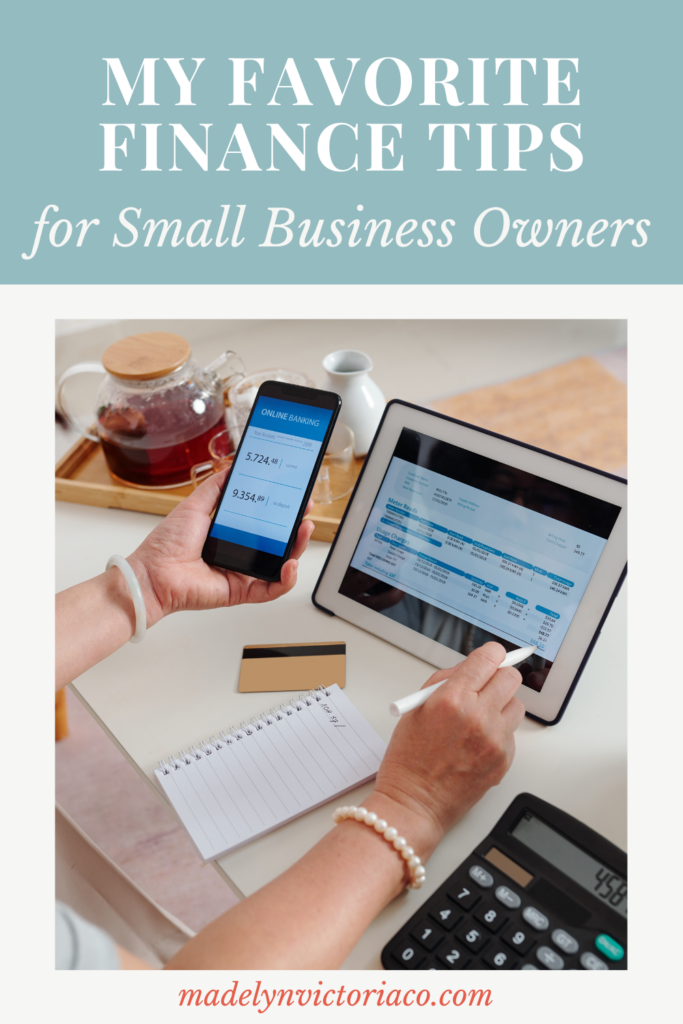If you own a small business, then you wear a lot of hats. Maybe you have an in-house accountant who manages all your expenses and reviews your P&L statement every quarter. But I’d be willing to bet that many of you who are reading this are wearing the managing-your-money hat.
That’s why I’m sharing my favorite finance tips for small business owners!
Whether you do or don’t have an in-house accountant or are or aren’t a fan of numbers, I’m here to make your life a little bit easier.
Keep reading to see how you can enter the next tax season prepared, how to make a budget that makes sense, and how you can actually have fun with money (gasp!).
Finance Tips for Small Business Owners

Make a budget
I know, this is the most basic finance tip ever. But you would not believe how many people don’t have a budget (both for their personal lives and for their business). It blows my mind. Many people think that making a budget is too cumbersome and they feel like it’s unnecessary.
The complete opposite is true. You need a budget. Period.
I like having a zero-based budget so that every penny is accounted for. Contrary to popular belief, I’ve actually found that following a budget gives me more freedom. I know that sounds contradictory. But hear me out.
Because I have a budget, I’m able to plan and set myself up for the future; it drastically decreases my guilt and worry. Plus, I have an overview of where all my money is going, which means I can also create line items for more “fun” expenses. In my personal account, I have a line item for “fun purchases,” and I can use that money literally however I want. New shoes? No problem. Tickets to a concert? Easy peasy. Overnight trip? Let’s do it.
Similarly, you could make a line item in your business budget for what I’ve come to call “unreasonable hospitality.” This phrase was coined in a book by the same name and is about creating extraordinary experiences and giving people more than they could imagine.
The world of marketing is all about appealing to customers and going above and beyond in how you make people feel. The hope and expectation is that you’ll build an amazing brand, your customers will keep coming back and tell others about you, too.
So what does “unreasonable hospitality” look like? If you’re a realtor, get to know your clients and give them a personal gift (instead of just a generic bottle of wine). Maybe it’s a watercolor painting of their first home or a bed for their new dog.
If you’re a wedding planner, maybe you give the couple you’re working with a gift card to the restaurant where they had their first date or frame a picture from their engagement.
These don’t need to be expensive gifts at all—it’s all about creating connections. But because you’ve created a budget and paid attention to how you’re spending your money, you have the flexibility to add a line item for unreasonable hospitality, which ultimately helps your bottom line.
Keep your personal and business lives separate
Again, this small business finance tip seems like a no-brainer, but you’d be surprised to know how many people forget or simply don’t know to keep their business and personal expenses separate.
You need to have a separate budget for your business and personal life. You also need a separate credit card and/or debit card for business expenses. Believe me, you do not want to pay for personal expenses with a business card (hello, messy business audit), just like you don’t want to pay for a business expense with a personal card (you won’t be able to write it off on taxes).
Just make it easy on yourself and keep your everything related to business separate from your personal life.
Running a small business can be a whirlwind, right? Small business owners are superheroes, juggling a million tasks at once, but they often struggle to find enough hours in the day to make a lot of progress… Want to hear my favorite time management hacks to actually get stuff done? >> Read this post!
Have separate business accounts
This is going to sound really confusing at first, but bear with me. Have separate business accounts. One for operating expenses, one for taxes, one for profit, and one for investment holdings.
I especially love having an account for taxes because the money immediately goes there. I take taxes out first because nothing sinks you quicker than being behind on your taxes (major yikes!). Plus, when taxes are taken out first, it’s a little bit easier to say goodbye to that money.
To get a more detailed explanation of how these separate business accounts work (and for even more financial tips for small business owners), read chapter six of the book, How to Grow Your Small Business by Donald Miller.
Organize your taxes well
I’m sure you knew this from the moment you laid eyes on this title of this post (because who writes about finance tips for small business owners and actually thinks it’s fun??), but I’m an organized freak individual.
I like having all my ducks in a row, but I know most people find it woefully unnecessary to use a label maker or have color-coded tabs (I definitely understand. They’re right: it is a little over-the-top).
However, what’s not over-the-top or unnecessary is providing an organized view of everything for your taxes.
Most accountants prefer digital files, so I find it’s easiest just to create a digital folder on my computer for the current year, then create separate folders inside of it for each quarter or month.
Be sure to download credit card statements and receipts from online orders and save them to this file. When you pay quarterly taxes, also download the records to this folder. And if you have any receipts that aren’t online, scan those in digitally and save them to tis folder, too.
You can be as detailed and organized as you’d like (the more so, the better for your account and for your business!). But taxes are incredibly important, so be sure you’re keeping track of everything as best you can.
Funnel everything in and out of QuickBooks
I won’t spend very long on this point because it’s pretty self-explanatory, but using QuickBooks is one of the best finance tips I have for small business owners. I absolutely love this software (we’ve already established that I’m a nerd).
Invoicing clients, paying employees, reconciling your bank account, distributing funds to your personal account, recording expenses—it all needs to be funneled in and out of QuickBooks. We want records of everything, both for your accountant’s sake and for yours as well.
You’ve Learned Some Finance Tips for Your Business, Now What?
How many of these finance tips for small business owners did you learn? How many did know, but just haven’t put into practice?
Be sure to ask your accountant for other finance tips for your business—I’m sure they’d be happy to share some with you.
I’d love to hear which tips you thought were the most helpful!

Madelyn is the owner of Madelyn Victoria Co. She’s a social media manager and ShowIt designer who helps service providers stand out online with a people-first strategy.
Madelyn believes your marketing should fuel growth, not drain your energy. Through strategic social media content and high-converting websites, she’s helped entrepreneurs get visible, build trust with their audience, and increase revenue by consistently attracting the right clients.






+ show Comments
- Hide Comments
add a comment